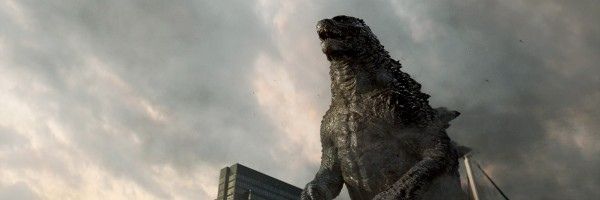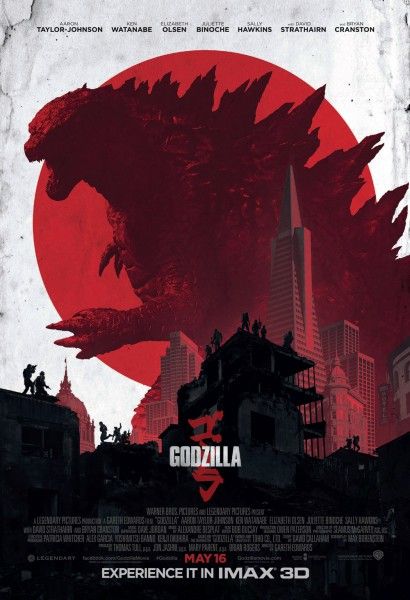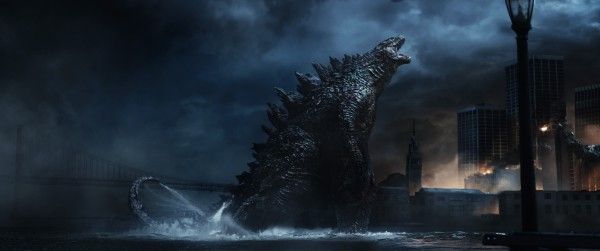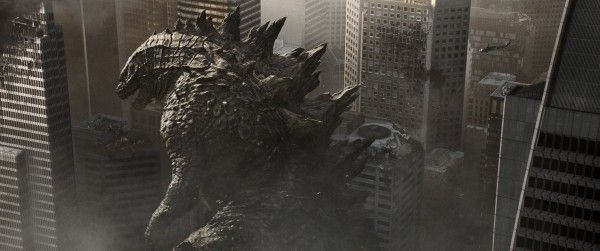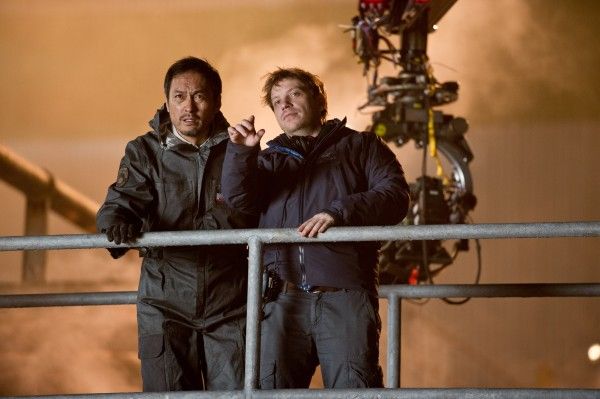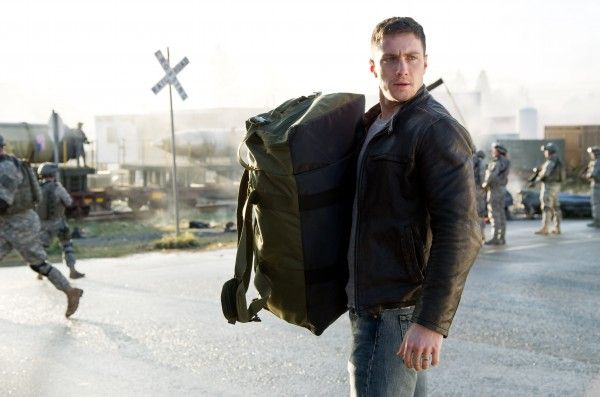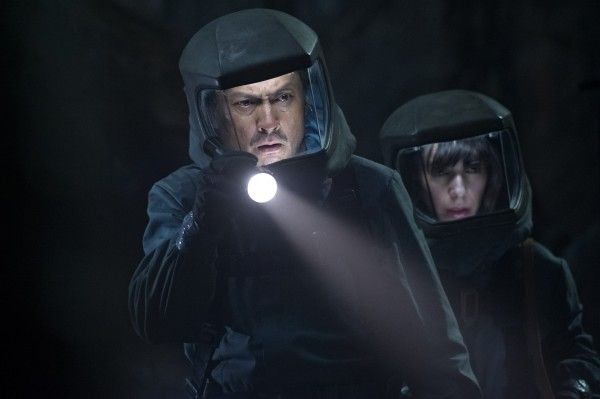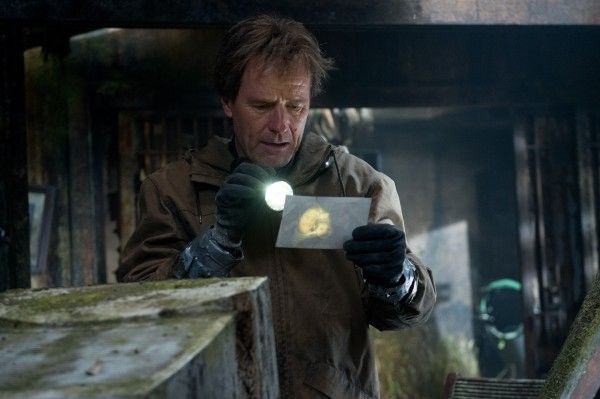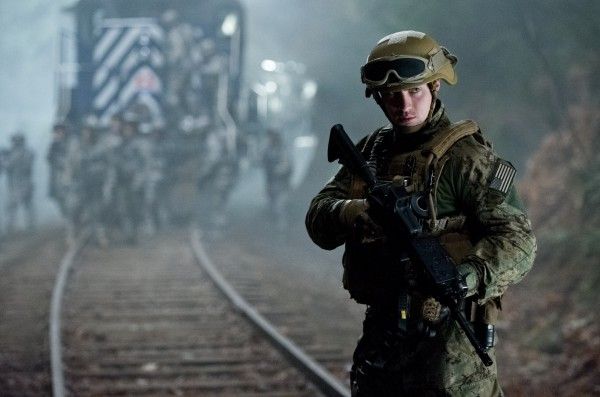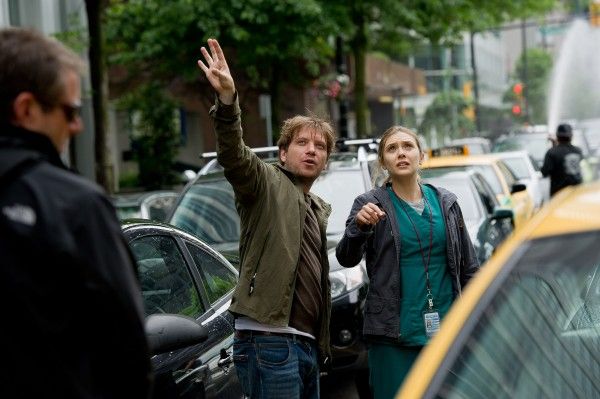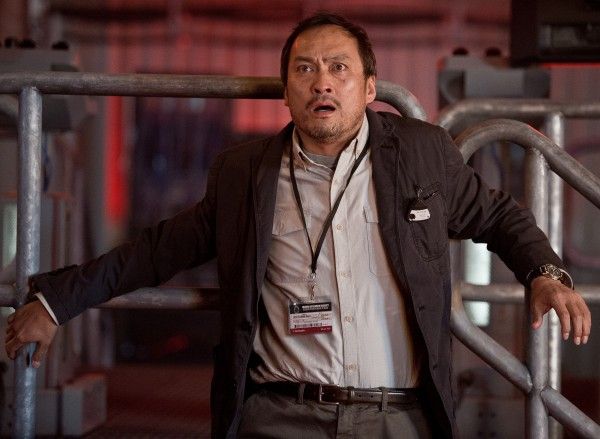The world’s most revered monster has been reborn, in a huge way, with Godzilla taking in big money at the box office and already setting a sequel in motion. Just before the film hit theaters in the U.S., Collider got on the phone with screenwriter Max Borenstein for this exclusive interview.
During the interview, he talked about what made him want to have a hand in reinventing such an iconic cinematic character, the challenge of making a film that’s fun and entertaining but also has real heart and humanity, why they wanted to create and anticipation for Godzilla instead of an over-saturation, what it was like to collaborate with director Gareth Edwards, how many variations of Godzilla’s origins and motivations they discussed, and finding the right ending for the film. He also talked about his work on Seventh Son, the Jimi Hendrix script that he wrote for Legendary and whether that might ever get made, what having scripts on The Black List did for his career, what happened with the sci-fi space adventure Paladin that he wrote for Disney, and that he definitely wants to direct again soon. Check out what he had to say after the jump, and be aware that there are some spoilers.
Collider: Was there something specific that made you want to have a hand in reinventing such an iconic cinematic character, or did that initially make you want to run away from writing this?
MAX BORENSTEIN: I leapt at the opportunity. I never would have expected it, necessarily. I came from being a real film buff, film enthusiast and nerd, or whatever you want to call it. My reputation, as I started to develop one as a screenwriter, was in this character space, whether it was dramas or thrillers, or on a larger canvas. It always had to do with finding some grounded characters within the context of the story. I would never have thought that I was going to do a Godzilla movie, but I’m a huge cinephile. So, when that opportunity arose, it arose within the context of making a Godzilla movie with Gareth Edwards, whose first film I had seen and loved so much, precisely because it took a giant monster genre movie and used it as a vessel to tell this very intimate, almost indie film story.
I thought that was really cool. And the fact that Legendary and Warner Bros. were willing to invest in that guy to make a Godzilla film really spoke to the kind of Godzilla movie they’d be willing to make, which got me really excited. So, I went back and re-watched some of the films, but then watched, for the very first time, the original Japanese cut. I had only ever seen the American redo with Raymond Burr. I realized that this franchise that I had always really relegated to being something that was fun but campy had actually, once upon a time, been gravely serious and scary and interesting, in a lot of different ways. That, combined with Gareth’s involvement, made me want to do it.
Were you surprised that all of the parties involved really did want a big summer movie that also had heart and human stakes? Were you waiting, at any point in time, for them to tell you that those things needed to be removed from the movie?
BORENSTEIN: It’s funny, maybe it’s unique, but the creative team and the production team and the studio were very much on the same page about wanting to raise that bar and try to tell a Godzilla story that would feel moving and thematically and emotionally resonant, to the extent that we were capable. It’s a challenge with a movie like this because you’re also trying to make something that’s fun and entertaining and spectacular, in all these different ways, so there are limitations. But, everyone was always aiming at that high bar. That was a really special experience, and we’re all very proud of what we were able to do. It’s the Godzilla movie that we wanted to see, and it’s just a movie that we’re proud of. It meant making certain choices. Oftentimes with blockbusters and spectacle movies, these days, because of the ease of the technology and that CGI has become so much better than it ever has been before, there’s no longer the need to hold back how much we see of the creatures and how frequently.
In Jaws, they were limited, creatively, and they were forced not to show the shark ‘cause it wasn’t working. The result of that was that that necessity was the mother of invention because it resulted in all of this suspenseful build-up and all of these clever ways that Spielberg and Co. were able to ratchet up the tension without revealing the entire shark. Using just the fin as something that was scary was an idea. That wasn’t an obvious thing, until they did it.
All of those things are the things I love the most about that movie, and many movies like it, and I know Gareth is in the same camp. So, it felt like, just because we now have the ability to show the monsters, all the time, whenever we want, soup to nuts, from beginning to end, if we tried to limited ourselves to the extent we could, and then still be creative and create suspense, even with a creature of this scale, we would hopefully be aiming at the kind of movie that we’d want to see.
Because of that decision, did you then expect the criticism that some people have had, in regard to the film being too character-based and there not being enough of Godzilla?
BORENSTEIN: Landslide elections are 52%. Everyone has different tastes and different expectations, and expectations play into taste. Whenever you make a choice, creatively, that is bold, in one direction or another, there are going to be people who really respond to it and there are going to be people who really respond against it. And then, there are going to be people who initially respond against it, and when they see it again, now that they’re not expecting a different thing, maybe they’ll love it more. You never know. There’s no accounting for that. The only thing you can really do is try to make the movie that you’d want to see, and stick to your guns, if you make that decision. If you say, “We want to try to build suspense,” as a modus operandi, then you have to follow that.
Within that, there’s a lot of back and forth, and push and pull. We agonized over it in the storytelling, in the screenwriting process and continuing on through the editorial. It was always about getting that fine line. Some people will love the line we walked, and some people will think it was more on one side or another. But hopefully, everyone will appreciate that there were choices made that were not just coming from a place of, “Let’s throw all of our money at the screen,” but coming from a place of trying to do something that was gonna be as artful in its pop production as possible. This is hopefully pop art. That’s what we wanted to do.
How was the experience of working with and collaborating with Gareth Edwards?
BORENSTEIN: It was really the greatest creative and collaborative experience of my career, thus far. I admire his talent immensely, and only more so, having actually experienced it and seen it first-hand. The experience that we had, which is fairly unique, was really one of exploration, at first, and then refinement, over and over and over and over again. One of Gareth’s many unique talents and traits is that he is really unwilling to say yes to anything, until he has explored all of the other possibilities, creatively. That can be at the story level, or at the execution level. He’s a perfectionist, in a way that he knows he’s never going to make anything perfect, but he’s open to what creative possibilities there are and makes the hard decisions to take a new route, or throw something out and go in a different direction.
That was his process, all the way through, and it was something that we were really able to engage in, especially in the early stages of just talking about the story, for a long time, diagraming the story and coming up with the characters, and then changing the characters slightly and imagining new scenarios. We really dug deep, in terms of Godzilla’s motivation, what he’s after, and what the other creatures are. All of those things started from a completely blue sky place. It was both daunting and, at the same time, incredibly fulfilling to be able to embark on that process. In those early stages, it was really just him and me, batting ideas around for hours and hours and hours on end.
When you were having conversations about Godzilla’s origins and motivations, and you were talking about the events that lead to his re-emergence, how many variations did you talk about?
BORENSTEIN: We were unafraid of bringing up bad ideas, which I think is crucial. So, a lot of bad or wrong ideas came up, many, many times. Some of them were just wrong for this movie, but not bad ideas, in general. They ran the gamut. The thing that was helpful was having an anchor and some sort of eye on a prize, in terms of the kind of movie we wanted to make. We all agreed, and the studio agreed, that we wanted to make a Godzilla film that would feel grounded and serious. That’s not to say it’s self-serious, in a way where it’s not fun or doesn’t have a certain humor to it, but not cheeky or irreverent humor that would undercut the story. We wanted to go for a tone that imagined, “What if Godzilla really came, in 2014, out of the ocean? Then what?” That was immediately limiting, but in a good way. It meant that we couldn’t have wise-cracking moments or satire. We weren’t going for that. I love those kinds of movies, but that’s not what we were going for.
So, that was a good limitation, from an early phase, and it helped us hone in on the story we were doing. We asked ourselves, “What is a human story, in the context of Godzilla?” He’s a monster that doesn’t dictate one specific human story, in the way that King Kong might, or Jaws might. A Jaws story is obviously going to be someone who’s somehow dealing with the ocean – either a fisherman or a vacationer, or whatever – and, at some point, they’re going to have a mano-a-mano struggle with this shark. But Godzilla is so much larger than people, figuratively and literally. He represents something that is inherently the thing that reminds us that we’re powerless. We can’t beat him, and he is immune to the single most destructive weapon we’ve ever invented. He is outside our control, in every way. He also doesn’t relate to us in an anthropomorphic way. That means that the human story in a Godzilla movie can really be anything. And then, you go, “That’s scary. How can we hone in on the right human story to tell?”
For us, it came down to starting to think about what our Godzilla movie is about, thematically. There is no one theme for a Godzilla movie, except there is this common denominator of maybe Godzilla is representing the atomic bomb, or he’s representing the threat of an environmental catastrophe or bio-engineering, or whatever. He’s represented all of those things, over the course of 60 years. But in every case, it’s this idea of some force that makes us powerless and remind humanity that we are insects on the surface of the planet. And so, it felt like the thing that does that a lot, in this day and age, are natural disasters that aren’t completely natural, whether it be Hurricane Katrina where there’s a human toll that’s taken because of improperly built levees, or it’s Fukushima where there’s a tsunami that’s a natural event, but we built a plant poorly and in the wrong place. There are all of these big events that happen that are cataclysms. And then, you say, “Well, what are the human stories in those events?”
A lot of the time, it comes down to people being reminded of what’s really important. We’re so very good at living in the future and so very bad at living in the moment, which is a cliche, but it’s true. So, in those cataclysmic times, we see people pull together and we see families reunited. It felt like, to focus on that humanity, and on the idea of survival and family and that struggle through a disaster to the reuniting of family, that was a story that made sense within the context of this Godzilla.
Did you come up with your ending fairly quickly, or did that also take different forms, as you figured out exactly what your story was?
BORENSTEIN: Certainly, like everything, it’s a moving piece, to a certain extent. You try to fix it, as soon as you can. In terms of the details of how it wrapped up, it was tricky. I won’t spoil it, but we knew the basic shape of it. The real trick was, “How do you give your human characters a way to be involved, that’s in line with the tone of the film?” Some Godzilla films – and it’s a choice we could have made, but didn’t – would have a human hero in the film that’s almost super-heroic, almost like John McClane (from Die Hard). He’s the one man who can stop it, and he’s going to single-handedly do something epic.
But we decided – and it was a very deliberate choice – that because we were asking the audience to believe in the existence of a 350-foot lizard for two hours, that everything else we should try to make as real, relatable and grounded as possible. So yes, it’s okay to have a character who’s an explosive ordinance disposal guy for the Navy, but it’s not okay to have him be the most bad-ass Navy SEAL, who’s also the one guy that knows everything there is to know about Godzilla. We didn’t want that guy.
There are a lot of great movies that do that Indiana Jones guy, but when you do Indiana Jones, you don’t have him in a Godzilla movie. He’s in the real world, and he’s Indiana Jones. We felt like it would be overdoing it to have that character in this movie. It would at least defy the tone we were going for. That’s why we went for characters that felt as organically of a piece with this world as possible. Ultimately, in any story, you’re going to be relying on a certain amount of convenience and coincidence to try to bring everything together, but we wanted those machinations and gears to show as little as possible, when you’re watching the film.
You also worked as a screenwriter on Seventh Son. Have you gotten to see a rough cut of that, at all?
BORENSTEIN: I actually haven’t, no. I worked on the script to that before I went and started on Godzilla, and I was one of several writers who worked on it. Godzilla became a relatively consuming thing for the past three years. I’ve worked on other things, as well, but Godzilla has been the mainstay. Seventh Son was shot in the interim. I’ve heard great things, but I haven’t seen it.
You also wrote a screenplay about Jimi Hendrix.
BORENSTEIN: Yeah, that was the first project that I worked on at Legendary, actually. Because Thomas Tull, who’s the Grand Poobah at Legendary, sets the tone, creatively and taste wise, for the group there, which is really great, he, in addition to being the world’s single biggest Godzilla fan, he’s also a huge rock ‘n’ roll fan. He really wanted to do a movie about Jimi Hendrix, and I’m a huge music fan, as well. So, that was a really cool one to work on.
What is the status of that film? Is it something that will ever get made?
BORENSTEIN: We’ll see. I’m hopeful. Without getting into all of the nitty gritty of it, we had a lot of momentum on it and there are a lot of people who would dive right in and make that movie, right away. It has to do with music rights, which are controlled by the Hendrix estate. The ball is completely in their court. So, we will see. I’m very hopeful. It would be a dream come true, if that project was able to get off the ground. I think Jimi is a uniquely fascinating character because people don’t really know much about him. There’s much to be done, but the populus, by and large, has certain preconceptions about him, based on the way that he was sold, some of which is true, but a lot of which really just plays into stereotypes of the moment, whether it was that he was an acid freak or a magical maestro at playing guitar. All of those myths gloss over some of the more interesting things about the guy, who was a really exceptional artist and a great songwriter. Oftentimes, he’s not given credit for that. People think about him just as a player because, obviously, he was the greatest, ever. But, he was starting to get into some really experimental songwriting stuff when he died randomly and tragically.
You’ve had a few scripts on The Black List. Does that really lead to meetings and have an impact on your career?
BORENSTEIN: That was great. I had been working as a screenwriter, doing rewrites professionally, for a few years before The Black List came out, but getting that recognition was a big deal and really cool. It’s great because screenwriting is a very lonely thing sometimes, particularly because the thing that you’re producing isn’t ultimately a finished product, which can be very disheartening. A very high percentage of scripts that get written, and a very high percentage of very good scripts and great scripts, never become movies, for countless factors that really have nothing to do with the script. And that’s not to mention all of the scripts that are not great, of which every great screenwriter I know has written many, myself included. That difficulty to get a movie made means that your screenplays are these blueprints that never become buildings. So, having a forum where they get appreciated, in some way, and there’s some recognition for that and there are fans of that, which the internet has really helped to spark, is great.
When I was growing up and wanting to make movies, I was fortunate enough to get a pseudo-internship at a really young age, where I was given screenplays to read, which wasn’t something that you could get anywhere, at that time. Now, it’s very accessible on the internet, which is fantastic. So, at the time, I read the screenplays for American Beauty and The Sixth Sense, or whatever the hot things of the moment was, before it came out. That’s how I learned the trade. There’s a very special thing to it, and it’s very unique. It’s not like reading a play or a novel, or any other finished work.
A couple years back, it was reported that you were writing a sci-fi space adventure called Paladin. What happened with that?
BORENSTEIN: We’ll see. It has not been made yet, but it is not out of the question. It’s for Disney, and they have some other space adventures that you might have heard of. We’ll see what happens. I think the script is in a good place, and the producer, me and the people involved are excited about it. So, we’ll see what happens, and when the moment is right. There are just so many moving pieces that have nothing to do with your project. I’ve seen, even the 10 years that I’ve been doing this, which is relatively short but not so short that I don’t feel like something of a veteran, that movies that I thought were dead, come back to life. And that one is far from dead.
Do you have a lot of scripts in a drawer, that you have tucked away, but that could come back out, at any point?
BORENSTEIN: I’ve been working professionally for quite awhile, and there are scripts I’ve written that are not in my drawer. [Paladin] is in Disney’s drawer, and there are scripts like that, that are around. Some of them are in active development, and some of them are less active. And then, there are a couple precious things that are mine, that have some new momentum to them and that I’m working on. One of the things that’s so interesting about it, and it’s the case with a lot of people in creative fields that I know, is that it’s difficult to look back. There are some things that still hold up for you, but when I read old things, I just am immediately going to what I would have done differently, or what I would do differently now.
I think you have to be an eternal optimist, where you’re looking forward and you’re thinking that the next thing that you’ll be working on is the greatest thing you’ve ever made. If you don’t think that, then that’s it. You’re done. And it’s always an illusion. It’s not always the case that the next thing you make is going to be the greatest thing you’ve ever made. It’s like lightening in a bottle, and you never know what that next thing is going to be. But that ability to delude yourself, in a helpful way, into believing that you are onto whatever it is, in this big way, is essential for any creator. That’s something that I either suffer from or am blessed with, whichever way you look at it.
Do you have something that you’ve finished writing, that you know will go into production next?
BORENSTEIN: We’ll see. There is a secret project that I’ve been working on with the folks at Legendary, which I’m excited about. I think there’s a decent shot at that. I can’t get into details about it, but hopefully soon, it will hit the universe.
Do you have any plans to direct again?
BORENSTEIN: Yeah, I do. Absolutely! It’s where I started. I have an early film that I wrote, that I’m excited about putting together to direct. That’s definitely high on my agenda. I love writing screenplays that I don’t want to direct. I think that’s wonderful, and I really enjoy that. I enjoy so many different kinds of movies, but I wouldn’t necessarily want to direct all of them. But, I absolutely want to direct some stuff again soon.
Godzilla is now playing in theaters.

